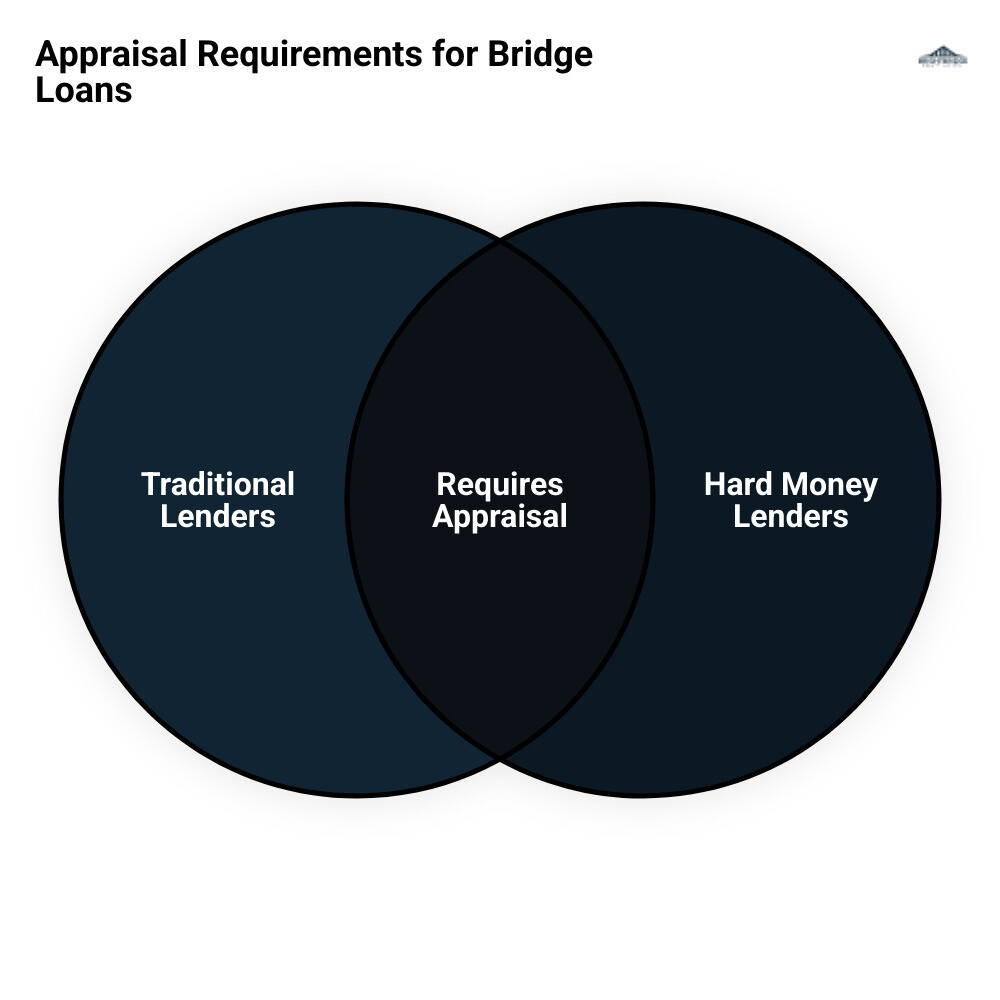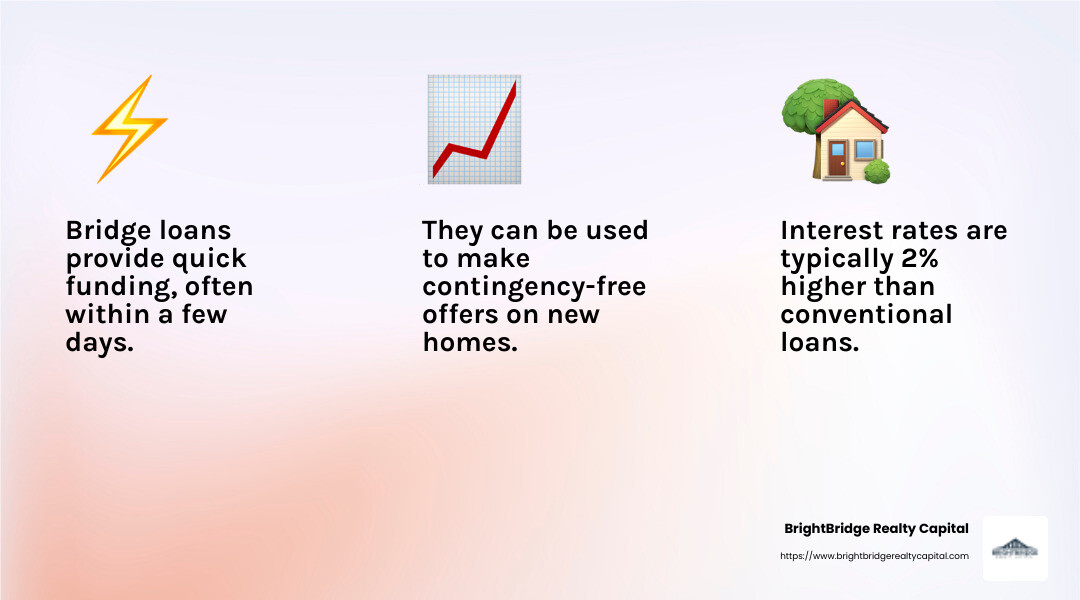Bridge Loans: When Do You Need an Appraisal?

Do you need real estate appraisal for bridge loans?
- Yes, traditional lenders will require an appraisal.
- No, hard money lenders might not require an appraisal, depending on the specifics of the deal, lending amount, and leverage ratio.
In the busy world of real estate, timing is everything. Whether you're looking to secure a new property or jump on a lucrative investment, bridge loans offer a much-needed solution. These short-term financing tools help real estate investors and homeowners steer the gap between securing a new home or investment and selling an existing asset.
Bridge loans shine in their ability to swiftly provide capital, keeping real estate opportunities within reach. The critical question on many investors' minds is: Do you need real estate appraisal for bridge loans?
While traditional lenders require it, hard money lenders offer flexibility, often tailoring requirements to the unique conditions of each deal. Understanding these differences can be the key to making your next real estate move a success.

Do you need real estate appraisal for bridge loans glossary:
- bridge loans for commercial real estate
- how does a bridge loan work in real estate
- what is a bridge loan commercial real estate
Understanding Bridge Loans
Bridge loans are a type of short-term financing that fill the gap between buying a new property and selling your current one. They are often called "gap loans" because they bridge the financial gap during transitional periods in real estate transactions.
Short-Term Financing
Bridge loans are designed for quick, temporary funding. They typically last from 6 months to a year, providing just enough time to sell your existing property or secure long-term financing. This short-term nature means they often have higher interest rates compared to traditional loans.
Gap Loan
Imagine you're trying to buy a new home but haven't sold your current one yet. A bridge loan can provide the funds you need to purchase the new property without waiting for your old home to sell. This is why they're called "gap loans"—they cover the financial gap and help you move forward without delay.
Home Equity
Your current home often acts as collateral for a bridge loan. This means the lender uses your home's equity as a safety net. If your home has gained value, you can borrow against that increased equity. This makes it easier to secure a bridge loan, even if the process can be more complex than traditional financing.

Bridge loans are a powerful tool for those who need quick access to funds. They allow you to seize opportunities without the wait, making them a popular choice for savvy real estate investors and homeowners alike.
Do You Need a Real Estate Appraisal for Bridge Loans?
When considering a bridge loan, one of the first questions that comes up is: Do you need a real estate appraisal for bridge loans? The answer depends largely on the type of lender you're dealing with—traditional or hard money.
Traditional Lenders and Appraisals
Traditional lenders, like banks, typically have strict requirements when it comes to appraisals. If you're working with a lender that follows guidelines set by Fannie Mae or Freddie Mac, expect to undergo a formal appraisal process. This is because traditional lenders need to ensure the property's value justifies the loan amount. They rely on appraisals to minimize risk and to offer competitive rates and terms.
For borrowers, this means additional time and cost. A formal appraisal can take weeks and cost thousands of dollars, potentially delaying your ability to act swiftly on a real estate opportunity.
Hard Money Lenders and Appraisals
In contrast, hard money lenders offer a more flexible approach. These lenders often evaluate deals on a case-by-case basis, focusing more on the value of the property and the borrower's exit strategy rather than following a strict set of rules.
Flexible Approach: Hard money lenders may not always require a formal appraisal. Instead, they might perform an in-house valuation or use a Broker Price Opinion to determine the property's worth. This can save time and money, allowing borrowers to move quickly on deals.
Deal-Specific Requirements: Whether an appraisal is needed often depends on the specifics of the deal. For high leverage loans, a formal appraisal might be necessary to ensure the lender's position is secure. For lower leverage loans, lenders might skip the appraisal altogether.
Borrower Benefits: The flexible approach of hard money lenders can be a significant advantage for borrowers. It allows them to act quickly, which is crucial in a competitive real estate market. However, borrowers should be aware that lenders may still charge due diligence fees, which could include costs for in-house valuations or third-party inspections.
In summary, whether or not you need an appraisal for a bridge loan largely depends on the lender you choose and the specifics of your deal. Traditional lenders will almost always require one, while hard money lenders may offer more flexibility.
Next, let's explore scenarios where bridge loans can be particularly beneficial, from purchasing a new home to expanding a business.
Scenarios Requiring Bridge Loans
Bridge loans can be a lifesaver in certain situations where quick cash is needed to seize an opportunity. Let's look at some common scenarios where these loans come into play.
Consumer Bridge Loan Scenarios
Home Purchase: Imagine finding the perfect home, but your current house hasn't sold yet. A bridge loan can provide the funds needed to buy the new home without waiting for the old one to sell. This way, you can put in a contingency-free offer, making your bid more attractive to sellers.
Job Relocation: If you land a new job in a different city and need to move quickly, a bridge loan can help you buy a new home before selling your current one. This allows you to relocate without disruption.
PMI Avoidance: You might want to make a 20% down payment on your new home to avoid paying Private Mortgage Insurance (PMI). A bridge loan can provide the extra cash needed for this larger down payment, saving you money in the long run.
Commercial Bridge Loan Scenarios
Investment Property: For investors, timing is everything. If a lucrative investment property becomes available, a bridge loan can provide the funds needed to secure it quickly, even if your current properties haven't sold yet.
Renovation Funds: Developers and business owners might need immediate funds to start renovations on a property. A bridge loan can cover these costs, allowing renovations to proceed without delay.
Business Expenses: During periods of transition, like acquisitions or expansions, businesses might need quick cash to cover expenses such as inventory or upgrades. Bridge loans can provide this funding, ensuring operations continue smoothly.
In all these scenarios, the urgency and flexibility of bridge loans make them a valuable tool. They allow individuals and businesses to act swiftly and strategically, turning potential setbacks into opportunities.
Next, we'll weigh the pros and cons of bridge loans to help you decide if they're the right choice for your situation.
Pros and Cons of Bridge Loans
Bridge loans can be a powerful financial tool, but like any tool, they come with both advantages and disadvantages. Understanding these can help you decide if a bridge loan is the right choice for your situation.
Pros of Bridge Loans
Quick Funding: One of the biggest advantages of bridge loans is how fast you can get the money. When you need to act quickly—say, to grab a great real estate deal or to cover urgent business expenses—a bridge loan can provide the funds you need in a matter of days, rather than weeks or months. This speed can be crucial in competitive markets or time-sensitive situations.
Flexibility: Bridge loans offer flexibility in terms of how you can use the funds. Whether it's for buying a new home, renovating a property, or covering business expenses, these loans can be custom to meet your specific needs. This flexibility makes them a versatile option for both individuals and businesses.
Avoiding Contingencies: With a bridge loan, you can make an offer on a new home without having to wait for your current home to sell. This contingency-free offer can make your bid more attractive to sellers, potentially giving you an edge in a competitive housing market.
Cons of Bridge Loans
- High Interest Rates: The speed and flexibility of bridge loans come at a cost—higher interest rates. Bridge loans typically have interest rates that are about 2% higher than conventional loans. This means you'll pay more over time, which can add up quickly, especially if the loan takes longer to repay than expected.

Multiple Mortgage Payments: If you're using a bridge loan to buy a new home before selling your old one, you may end up with two mortgage payments at the same time. This can strain your finances, especially if your old home doesn't sell as quickly as you hoped. It's important to be prepared for this possibility and have a plan in place to manage these payments.
Risk of Foreclosure: If you're unable to sell your old home or secure permanent financing in time, you could face the risk of foreclosure. Bridge loans are short-term solutions, and the lender expects repayment within a set period. Failing to meet this deadline can have serious consequences, so it's crucial to have a clear exit strategy from the start.
In summary, while bridge loans offer quick access to funds and flexibility, they also come with higher costs and risks. Weighing these pros and cons carefully can help you make an informed decision about whether a bridge loan is the right choice for you.
Frequently Asked Questions about Bridge Loans
What is a bridge loan in commercial real estate?
A bridge loan in commercial real estate is a short-term financing option that helps investors and businesses manage cash flow between property transactions. These loans are often used to finance the purchase of a new commercial property before selling an existing one. They provide quick access to funds, enabling investors to seize opportunities in a competitive market.
Bridge loans are typically repaid within 6 months to a year. They offer flexibility, allowing borrowers to use the funds for various purposes, such as renovations or covering business expenses. However, it's important to note that bridge loans come with higher interest rates compared to traditional loans.
Alternatives to Bridge Loans
If a bridge loan doesn't seem like the right fit, there are other options to consider:
Home Equity Line of Credit (HELOC): This works like a credit card, allowing you to borrow against your home's equity up to a certain limit. You pay interest only on the amount you draw, providing flexibility in managing your funds.
Home Equity Loan: This option lets you borrow a lump sum against your home's equity, with fixed monthly payments. It offers predictability and can be a good choice if you prefer stable payments.
Cash-Out Refinance: This involves replacing your current mortgage with a larger one, using the extra funds for other needs, such as a down payment on a new property. However, your home cannot be listed for sale when you apply for this loan.
These alternatives can provide the necessary funds without the higher interest rates associated with bridge loans.
Who offers bridge loans?
Bridge loans are offered by a variety of lenders, each with different requirements and terms. Traditional lenders, such as banks and credit unions, typically have stricter guidelines and require appraisals. They offer competitive rates but may take longer to approve the loan.
On the other hand, hard money lenders and private lenders offer more flexibility and faster approval processes. They often focus on the property's value and the borrower's exit strategy rather than a detailed financial review. While these lenders provide quicker access to funds, they usually charge higher interest rates.
When considering a bridge loan, it's important to choose a lender that aligns with your financial needs and timeline.
Conclusion
At BrightBridge Realty Capital, we understand that real estate investments require agility and precision. That's why we offer customized financing solutions custom to meet the unique needs of each investor. Whether you're flipping properties, expanding your portfolio, or funding a renovation, our bridge loans are designed to provide the quick, flexible funding you need to stay competitive in the market.
Our seamless process ensures fast closings, often within a week, so you can seize opportunities as they arise. By cutting out intermediaries, we offer competitive rates and a direct lending experience that simplifies the complexities of real estate financing.
If you're ready to move forward with your investment plans, explore our services to find the right solution for your needs. Let BrightBridge Realty Capital be your partner in bridging the gap to your next real estate success.


